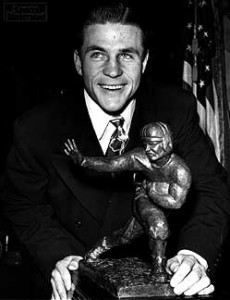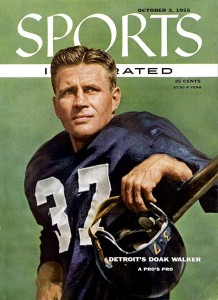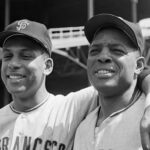Remembering College Football Legend Doak Walker
It was 85 years ago today, January 1, 1927, that one of the great legends of college football was born in Dallas, Texas. At a time soon after World War II when college athletics was at its peak, Doak Walker became a national hero and Heisman Trophy winner for the Southern Methodist Mustangs.
A high school teammate of another Texas football legend, Bobby Layne, Walker was a triple threat as a running back, defensive back and kicker. While Layne decided to play collegiately at the University of Texas, Walker chose to stay in Dallas and attend SMU.
While Walker played football, basketball and baseball at SMU, it was on the gridiron where he gained his greatest fame.
After playing briefly for the Mustangs as a freshman in 1945 and then serving 1946 in the Army, Walker started to build his legacy during the 1947 campaign. Dangerous both as a runner and passer, Walker quickly developed into one of the top players in the country.
The 1947 Mustangs won their first nine games before ending the year with ties against TCU (19-19) in the regular season finale and Penn State (13-13) in the Cotton Bowl. In the game against TCU, Walker had runs of 80, 61 and 56 yards. He finished the year third in the Heisman Trophy balloting behind John Lujack and Bob Chappius.
The next season Walker claimed the Heisman Trophy while leading SMU to a 9-1-1 record and their second straight Southwest Conference Championship.
It was during this season that SMU began playing their home games permanently in the newly expanded Cotton Bowl, which became known as “The House That Doak Built.” The season ended with a 21-13 victory over the University of Oregon (quarterbacked by Norm Van Brocklin) in the Cotton Bowl.
After starting the 1949 season with a 5-1-1 record, the Mustangs lost their final three games to end the season with a 5-4-1 mark.
Though Walker did not repeat as the Heisman Trophy Winner (Walker finished third behind Leon Hart and Charlie Justice), he did earn consensus All-America honors for the third straight year.
SMU posted a 23-5-4 record during Walker’s final three seasons and won a pair of SWC championships. He completed his college career with 288 points, 2,076 rushing yards, 1,786 passing yards (completing 128 of 22 attempts), 454 yards receiving, 764 yards returning kickoffs and 750 yards returning punts.
Walker was selected by the New York Bulldogs with the third pick of the 1949 NFL Draft, but never played for the Bulldogs as he returned to SMU for the 1949 season and then was traded to the Detroit Lions.
In Detroit, Walker was reunited with his former high school teammate Bobby Layne and the pair proved to be vital components in making the Lions consistent contenders for the first time in nearly 20 years.
As a rookie, Walker led the NFL with 128 points, which at the time were the second most scored in a single season in league history and still rank tied for 95th all-time despite the fact that there were 12 games in a season in 1950, compared to 16 today.
After posting a 6-6 record in 1950, the Lions went 7-4 in 1951 and then won the NFL Championship in 1952.
Walker had earned All-Pro and Pro Bowl honors in 1950 and 1951, but was limited to just seven games in 1952. However, in the NFL Championship Game, Walker did rush for 97 yards and scored on a 67-yard run to help the Lions defeat the Cleveland Browns 17-7.
In 1953 Walker returned to his All-Pro form as the Lions went 10-2 and then won their second straight NFL Championship. He accounted for 11 of the 17 Detroit points in the NFL title game with a touchdown run, field goal and two extra points as the Lions defeated Cleveland 17-16.
Walker earned All-Pro honors for the fourth time in five seasons in 1954, but the Lions fell just short of a third straight NFL Championship as they lost the NFL Championship Game to the Browns 56-10.
The Lions struggled to a 3-9 record in 1955 and though Walker was named to the Pro Bowl for the fifth time in six NFL seasons, he decided to retire from the game at the age of 28.
Walker completed his career with 534 career points (twice leading the NFL in scoring), 1,520 yards rushing, 2,539 yards receiving, 968 yards returning kickoffs and 284 yards returning punts. He also had two career pass interceptions and tossed a pair of touchdown passes.
It didn’t take long for Walker to be named to the College Football Hall of Fame as he received that honor in 1959. In 2007, ESPN ranked Walker as the fourth greatest college football player of all-time. In 1990 the award given to the best college running back was named the Doak Walker Award.
Because he spent only six seasons in the NFL, it did take a little longer for Walker to earn a spot in the Pro Football Hall of Fame. After being a finalist four times, Walker was finally selected to the Hall of Fame in 1986.
Walker suffered a paralyzing injury in a ski accident Jan. 30, 1998, at Steamboat Springs, Colorado, and he died Sept. 27, 1998.
Now, on the 85th anniversary of his birth, we remember Walker as one of the all-time greats in college football history.











